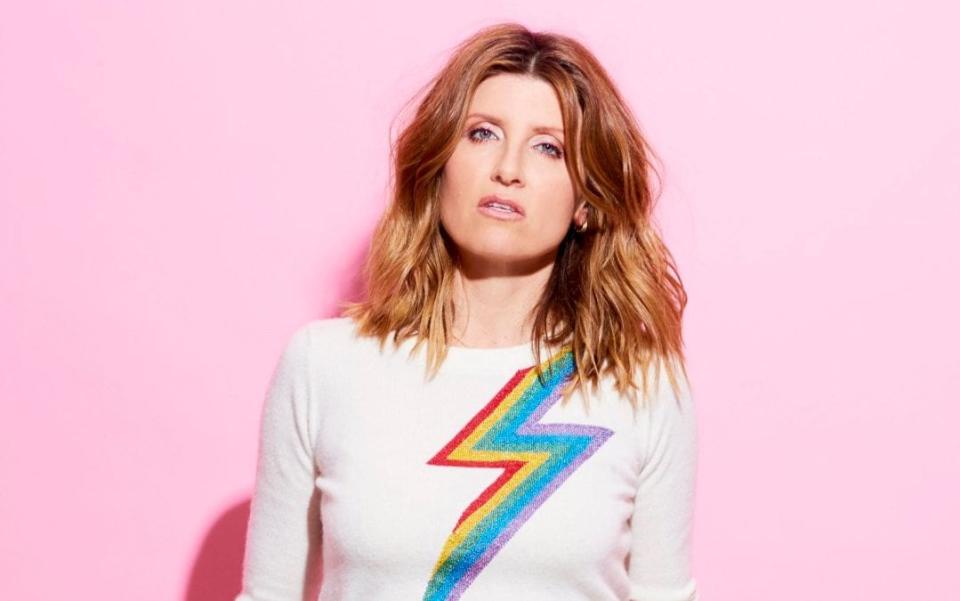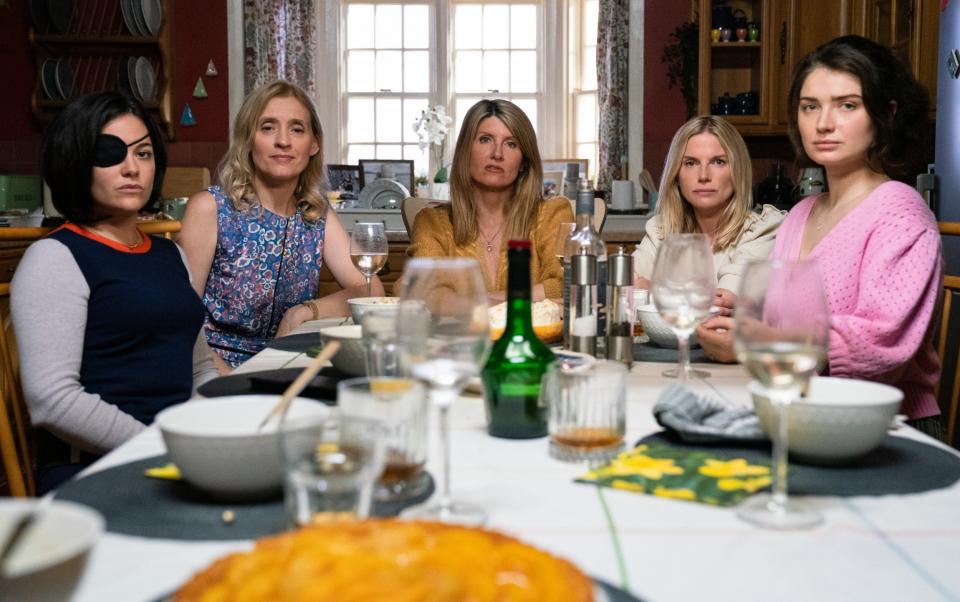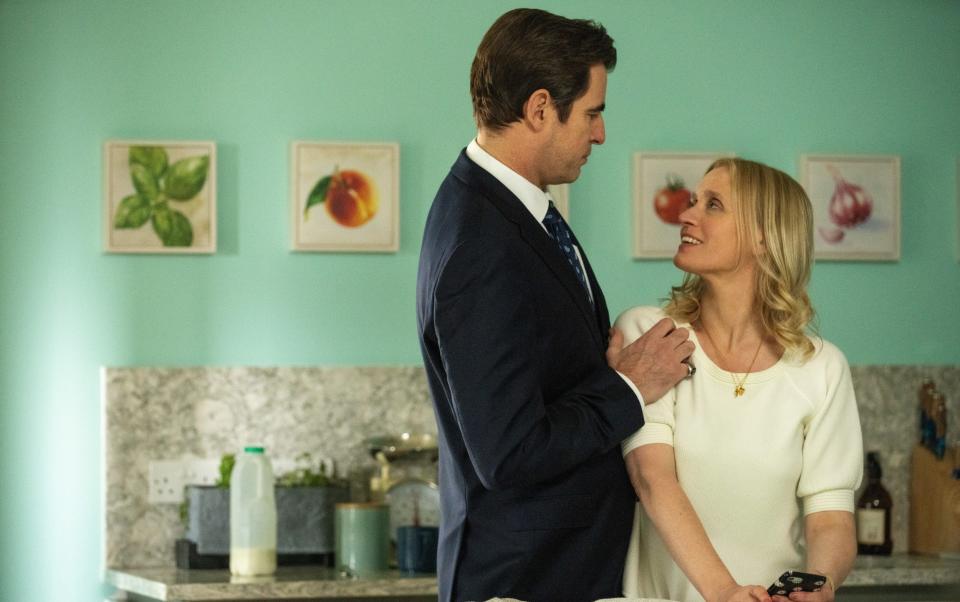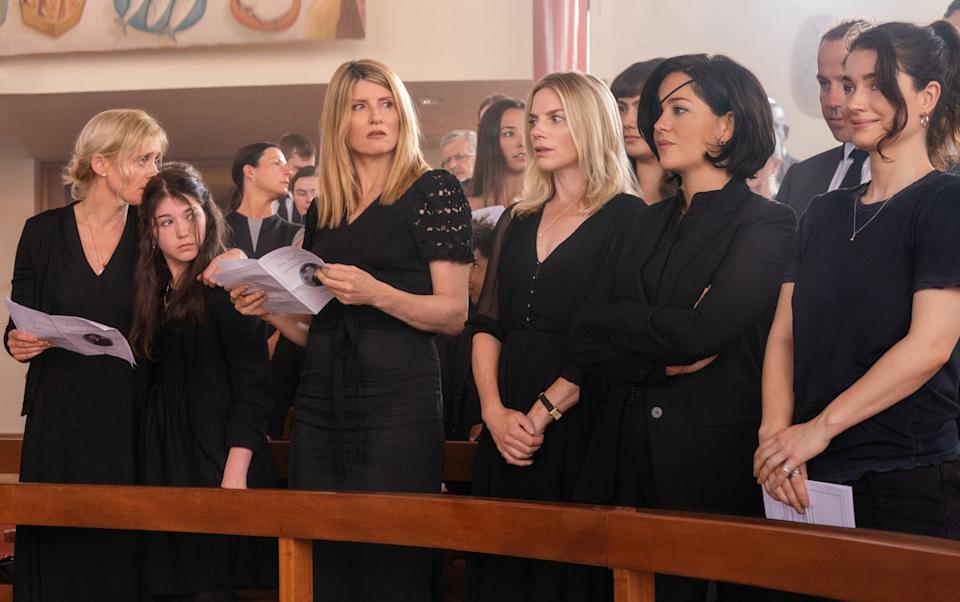Sharon Horgan interview: ‘I dream a lot about killing people’

“I dream a lot about killing people,” says Sharon Horgan, her voice crackling with laughter. “That terrible thing of having killed someone and then trying to figure out what to do with the body.”
It’s early morning in New York – I’m calling from London – and we’ve sauntered casually on to the topic of murder. She’s always had this dream, she confides, but after making her new Apple TV+ show, Bad Sisters, “it’s just a regular occurrence”. She’s being playful, but also serious. “I get very angry. I’m fuelled by it sometimes. I don’t know what that is or where it came from. But yeah, I’ve often felt like killing someone.” Pause. Afterthought: “It’s not something I would move forward with, by the way.” The punchline is delivered slyly, in her soft Irish accent, with perfect comic timing. Being funny comes naturally to Horgan, who has created some of the defining TV comedies of the past 15 years. “I feel like how I even construct sentences, you know, in regular life, they have a certain kind of comedic slant.”
Allied to a ferocious work ethic (she only takes “four-minute lunchbreaks”, her Catastrophe co-writer Rob Delaney complains), Horgan’s sharp observational wit has given us hits such as Motherland, Catastrophe and Pulling, as well as hidden gems, like the 2007 series Angelo’s, in which she plays one half of a bobbies-on-the-beat couple. In the first episode, they sneak off to see a doctor about their difficulties conceiving. Stung by her partner’s admission that he masturbates twice a day, Horgan’s PC says, “Just one last thing Doctor, Dave’s testicles are really, they’re small, aren’t they, quite unusually small… we were wondering if that might be one of the causes.”
Horgan, now 52, has been laughing at the fragile male ego on screen for years, but in Bad Sisters, she’s out to skewer it more literally. The show is about five siblings in Ireland, four of whom are trying to “rescue” the other one, Grace (Anne-Marie Duff), from a coercive husband – and by rescue, of course, I mean, murder “the prick”, as they call him.
Horgan, who stars as the eldest sister, Eva, adapted it from a 2012 Belgian TV show, Clan, and the husband in question is played by Danish actor Claes Bang – best known in Britain for his deliciously witty Count in Mark Gatiss and Steven Moffat’s Dracula. His John Paul, by contrast, is a monster: controlling, mocking and malevolent beneath a veneer of propriety. On Christmas morning, he hands his wife a glass of champagne so that he can stop her joining her sisters for their annual festive dip in the sea – “You can’t drive… Are you kidding me? Come on now, think.”

Before Bad Sisters, Horgan had begun writing something about a woman with older children starting again in her 50s, which mirrored what she was going through in her own life. Back in 2005, after six months of dating, she dived into marriage with businessman Jeremy Rainbird – an experience she drew on for Catastrophe, about a brief transatlantic fling that leads to a pregnancy that leads to a marriage between two people who barely know each other.
In 2019, Rainbird and Horgan divorced amicably, and continue to co-parent their two teenage daughters, Sadhbh and Amer. Horgan tried to write about it but realised it was too soon – “It would have been pretty grim reading... You need perspective to write about those things. That old adage of ‘comedy is tragedy plus time’. It really is.”
Is starting again in your 50s daunting? “I do think you’re more unafraid, because less is sort of unknown. But yes, it’s daunting. I mean, I had to get over, like, waking up in the middle of the night wondering if I was gonna die alone. I had all that. I just had to learn how to enjoy my own company, you know – I’m someone who doesn’t love the sound of silence, I need to hear someone laughing in the next room – and building up a bunch of tools that mean I can sort of operate on my own if I need to. I don’t think I want to, but I think if I need to, I have those tools.”
Privately, her life may have been chaos, but professionally it was on fire. She now has deals with Amazon and Apple, after creating the hit US shows Divorce and Shining Vale, and starring in Dennis Kelly’s Bafta-winning lockdown drama, Together, in which she and James McAvoy play spouses who can’t stand the sight of one another. Motherland, too, her depiction of harassed, middle-class parenthood won a Bafta this year; Horgan has stepped back from writing it, but it is still her baby.
A new dilemma she faces is how to write about older children. “When you’re inspired by somebody in your life, you know, a friend or a work colleague or an ex-lover or an ex-husband or whatever it is, I feel like sometimes, it’s sort of fair game. But with my daughters, I just feel like I couldn’t do that to them. I mean, they’d also go nuts. But… it doesn’t mean I can’t write about what it’s like to have a teenage boy.”
Horgan was born in London, but her parents moved back to her mother’s native Ireland when she was a tot to start a turkey farm, on which she was expected to help with the plucking. Her father is a New Zealander, but she self-identifies as Irish. “I went through a period of just describing myself as a Londoner, because I do think it’s a very specific type. And I haven’t lived in Ireland for so long. But it’s weird, as you get older, and with the passing of time, and everything, I feel more and more connected.”
Horgan floundered a bit in her 20s, dropping out of art college in Dublin, moving to London, failing to get into every drama college, squatting, working in a Kilburn job centre for six years, before going back to university.
In between, there was the time as a backing dancer in her friend’s boyfriend’s band; the time when the would-be Svengali spirited her off to Switzerland saying he was going to make her a star, before turning very creepy and hiding the passports of Horgan and her sister; the time when she bought a bass guitar – “I decided I was going to be Kim Gordon [of New York punks Sonic Youth]. I think I had one lesson, but I was just operating as a fan… the very thought of being on stage, the focus on you in that way… I’m a really shy person.”

Again, this isn’t altogether surprising. There’s a sensitivity about Horgan’s writing that says: shy, observant introvert, driven to perform – that strange hybrid. No wonder she picked a song by The Smiths as one of her Desert Island Discs. (Morrissey is a classic of the type.)
Her life-changing moment came when she bumped into fellow wannabe actor Dennis Kelly, in a Camden bar. They started writing together and the result was Pulling (2006-9), their sitcom about three women sharing a flat in east London. Horgan and Kelly’s “misspent” 20s offered them an endless source of embarrassing, hilarious true stories about sex, relationships and cohabiting, and the show won a Bafta nomination, and ran for two seasons, but the period after it was cancelled was difficult for Horgan.
Kelly bagged the golden goose by adapting Roald Dahl’s Matilda into an international hit musical (and now film, to be released in November), whereas Horgan “was always busy, and I was always working. But I couldn’t find that next chapter. And I was watching Dennis write Utopia and Matilda, and I started going ‘What the hell!?’ For sure I was jealous of him. He knows that.”
Then came Catastrophe, written with her co-star Delaney, which ran for four seasons, won them a Bafta, and made Horgan a name in the US. It led to her HBO comedy Divorce, starring Sarah Jessica Parker, which predated Horgan’s own relationship upheaval, although five months working on it in the US, away from her family, did give her acute anxiety. “I thought I was having a heart attack! Physically, your heart kind of changes, and you’re lying in bed, wondering what the hell’s going on?” It was one reason why Bad Sisters, shot in Ireland and the UK, was so attractive. “I want to be near my family as well as my girls. I want to see my parents more regularly. I just didn’t want to do those long, lonely, long-distance jobs.”

Making a series for Apple, the richest company in the world, allowed her to assemble a dream cast, among them Eve Hewson (full name: Memphis Eve Sunny Day Iris Hewson, the daughter of U2 singer Bono) and Brian Gleeson (son of Brendan). And writing about a family of five siblings wasn’t a stretch – Horgan has two sisters and two younger brothers, including Irish rugby legend Shane Horgan – and her character, Eva, of course, has a little bit of Sharon in her.
“When I was younger, I was in shared living situations with women who were in terrible relationships that they kind of got stuck in. It’s really hard to step in. And lockdown was such a dreadful experience for so many families in abusive relationships. It made me feel really kind of guilty, just knowing this was going on. But when it’s entertainment, you know, in 10 episodes, you can’t just be wall-to-wall misery; it doesn’t work like that. And life isn’t like that.”
So Bad Sisters is a comedy, a family drama and a thriller. “There’s some really dark, brutal subject matter in there, but it’s also a bit slapstick, when it’s at its most silly.”
I wonder if she poured some of the things she most dislikes about men into the character of the husband. “I poured some of the things that I most dislike about people,” she corrects me, “but also what it is that makes a villain. The original character [in Clan] was a monster, but we wanted to have a man who is attractive to his wife. People like him, respect him… he’s someone who is involved in the community, a loving father and husband. But when you cast someone [like Bang] who’s attractive in a role like this, it’s tricky. I just wanted to make sure that he also came across as a clown, to strip his dangerous sexiness away from him.”
Her TV output has been consistently funny, but it has this emotional depth, too. Once, after watching a moving scene in Catastrophe, her father told her he’d always thought she’d “end up there” – writing powerfully felt, straight TV – but she tells me she won’t: “That’s not how I see the world… the reason why that moment was so hard-hitting is because one minute earlier you’ve been laughing.”
The first two episodes of Bad Sisters are on Apple TV+. The show continues weekly on Fridays

 Yahoo Movies
Yahoo Movies 